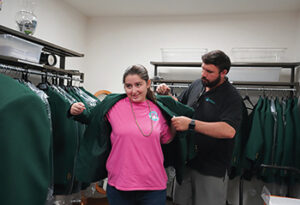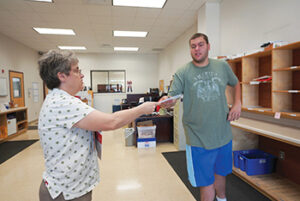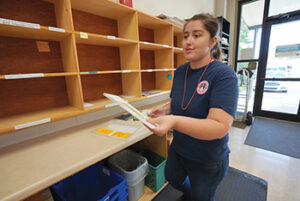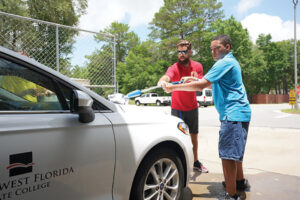Chris showed up to the Mattie Kelly Arts Center (MKAC) with a gleam in his eye. It was his second time to train as an usher for a ballet recital, and he already knew what to do.
“I got my jacket. I need a nametag. I’m ready!” said the 15-year-old as he got prepared in the cloak closet at the MKAC.
 Chris is one of seven students from the Emerald Coast Autism Center (ECAC) participating in the new program, Transition to Work, funded by the Florida Department of Education.
Chris is one of seven students from the Emerald Coast Autism Center (ECAC) participating in the new program, Transition to Work, funded by the Florida Department of Education.
“We are actually the second location in the state that has a Transition to Work program,” said Montana Hobbs, Assistant Director at the ECAC. “The students spend 15 hours a week learning functional education skills that will help them in the future to be independent and hold a job.”
 Transition to Work has been running at Niceville’s ECAC since October 2020, and is open to students age 17-21, with some younger volunteers tagging along to learn like Chris. The purpose of the program is to prepare young adults with Autism for the workforce.
Transition to Work has been running at Niceville’s ECAC since October 2020, and is open to students age 17-21, with some younger volunteers tagging along to learn like Chris. The purpose of the program is to prepare young adults with Autism for the workforce.
“It’s very difficult for kids on the spectrum to hold down a job so we are practicing skills inside our facility and then we go out into the community and perform those skills again,” said Patrick Mills, ECAC Transition to Work Coordinator. “We are really working on finding what the students are good at and what they enjoy, so that we can find a good job placement for them.”
 So far, the Niceville students have gained experience serving around Northwest Florida State College (NWFSC) at the MKAC, the campus vehicle bay, the mailroom and the Kay Litke Culinary Arts Greenhouse. Student Workers greet patrons at the MKAC, wash cars at the vehicle bay, sort mail and transcribe packages at the mailroom and plant seeds and water plants at the Greenhouse. Older students in the program have also begun working in the community at Sam’s Club and the Dollar Tree.
So far, the Niceville students have gained experience serving around Northwest Florida State College (NWFSC) at the MKAC, the campus vehicle bay, the mailroom and the Kay Litke Culinary Arts Greenhouse. Student Workers greet patrons at the MKAC, wash cars at the vehicle bay, sort mail and transcribe packages at the mailroom and plant seeds and water plants at the Greenhouse. Older students in the program have also begun working in the community at Sam’s Club and the Dollar Tree.
 “The Student Workers go out into the community with job coaches, but eventually we would like to be able to fade out so they don’t need a job coach,” said Patrick.
“The Student Workers go out into the community with job coaches, but eventually we would like to be able to fade out so they don’t need a job coach,” said Patrick.
Daniel Marino, the oldest student in the program at 21-years-of-age, has begun his community job at The Dollar Tree. When asked what his favorite part about the job is, he excitedly said “Snack!” Patrick explained that after every shift, Marino is rewarded with his choice of a snack and drink from the store, his beverage of choice? “Sprite!” he said with a smile.
Every student in the Transition to Work program sets their own course, Patrick said, as each has their own abilities and limitations. Some students are non-verbal and rely on iPad technology to communicate through pictures and short answer buttons; others are working on their speaking and social skills to better communicate their wants and needs.
“I’ve been around these students for a very long time,” said Patrick, adding that he has worked at the Emerald Coast Autism Center for 11 years. “I’ve seen some of the students come from working one-on-one up to now; they’ve come a very long way.”
There is no time-line for students to finish the Transition to Work program, but with each work experience, students gain new skills and confidence.
“We haven’t had anyone graduate yet, but we are just going to keep going until we find something that fits each student,” Patrick said. “Each week, as they practice these new social skills, learn new jobs and change their routines, every one of these things are critical pieces to them being successful in the workplace and in the future.”
For more information visit www.ecautismcenter.org.




























































